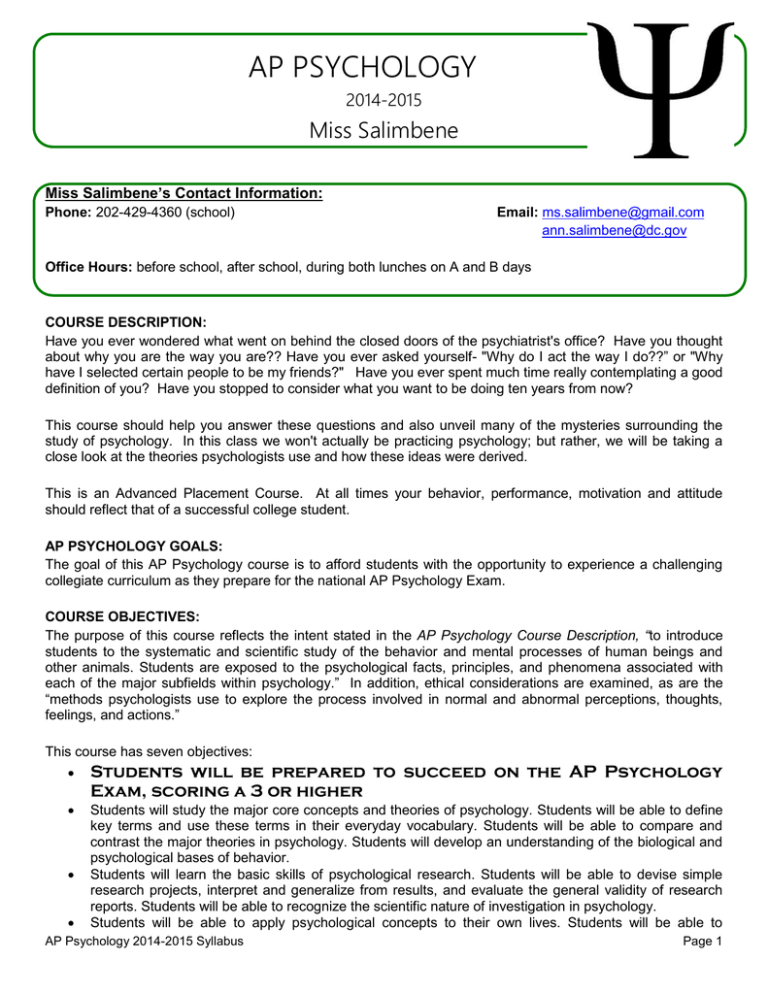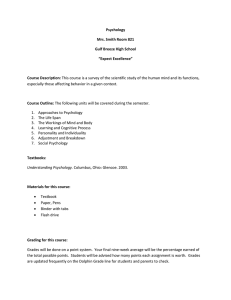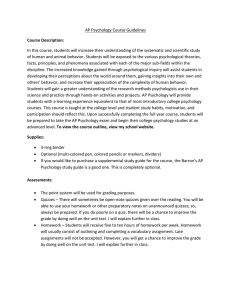AP Psychology Syllabus 2014-2015
advertisement

AP PSYCHOLOGY 2014-2015 Miss Salimbene Miss Salimbene’s Contact Information: Phone: 202-429-4360 (school) Email: ms.salimbene@gmail.com ann.salimbene@dc.gov Office Hours: before school, after school, during both lunches on A and B days COURSE DESCRIPTION: Have you ever wondered what went on behind the closed doors of the psychiatrist's office? Have you thought about why you are the way you are?? Have you ever asked yourself- "Why do I act the way I do??” or "Why have I selected certain people to be my friends?" Have you ever spent much time really contemplating a good definition of you? Have you stopped to consider what you want to be doing ten years from now? This course should help you answer these questions and also unveil many of the mysteries surrounding the study of psychology. In this class we won't actually be practicing psychology; but rather, we will be taking a close look at the theories psychologists use and how these ideas were derived. This is an Advanced Placement Course. At all times your behavior, performance, motivation and attitude should reflect that of a successful college student. AP PSYCHOLOGY GOALS: The goal of this AP Psychology course is to afford students with the opportunity to experience a challenging collegiate curriculum as they prepare for the national AP Psychology Exam. COURSE OBJECTIVES: The purpose of this course reflects the intent stated in the AP Psychology Course Description, “to introduce students to the systematic and scientific study of the behavior and mental processes of human beings and other animals. Students are exposed to the psychological facts, principles, and phenomena associated with each of the major subfields within psychology.” In addition, ethical considerations are examined, as are the “methods psychologists use to explore the process involved in normal and abnormal perceptions, thoughts, feelings, and actions.” This course has seven objectives: Students will be prepared to succeed on the AP Psychology Exam, scoring a 3 or higher Students will study the major core concepts and theories of psychology. Students will be able to define key terms and use these terms in their everyday vocabulary. Students will be able to compare and contrast the major theories in psychology. Students will develop an understanding of the biological and psychological bases of behavior. Students will learn the basic skills of psychological research. Students will be able to devise simple research projects, interpret and generalize from results, and evaluate the general validity of research reports. Students will be able to recognize the scientific nature of investigation in psychology. Students will be able to apply psychological concepts to their own lives. Students will be able to AP Psychology 2014-2015 Syllabus Page 1 recognize psychological principles when they are encountered in everyday situations. Students will develop critical thinking skills. Students will become aware of the danger of accepting or rejecting any psychological theory without careful, objective evaluation. Students will build their reading, writing, and discussion skills Students will learn about the ethical standards governing the work of psychologists. Students will maintain high ethical standards and sensitivity in applying the principles of psychology to themselves, other people, and other organisms. COURSE OUTLINE: AP UNITS: I. History, Approaches, and Scientific Method II. Biological Bases of Behavior CORRESPONDING READINGS: Chapter 1 (pages 2-51) Chapter 2 (pages 52-97) III. IV. V. VI. VII. Chapter 3 (pages 98-141) Chapter 4 (pages 142-179) Chapter 5 (pages 180-223) Chapter 6 (pages 224-265) Chapter 7 (pages 264-307) Sensation and Perception States of Consciousness Learning Memory Cognition, Intelligence and Testing Unit Exam Date: F September 12 1st Exam: W Sept 24 2nd Exam: M Oct 6 W October 22 M Nov 3 W Nov 19 W Dec 3 TH Dec 18th WINTER BREAK - Monday December 22 – January 4 – Winter Break Work Due: Monday, January 5th VIII. Motivation, Emotion and Work Chapter 9 (pages 354-391) T Jan 13 Chapter 8 (pages 308-353) Chapter 12 (pages 474-509) Chapter 10 (pages 392-425) Chapter 13 (pages 510-545) Chapter 14 (pages 546-581) Chapter 11 (pages 426-473) T Feb 3 T Feb 17 W March 14 January 20-23 MIDTERM EXAMS IX. X. XI. Development and Human Diversity Personality Stress and Abnormal Behavior XII. XIII. Treatment of Abnormal Behavior Social Psychology W March 18 W April 1 REVIEW FOR AP EXAM April 1st – May 4th COURSE ORGANIZATION This course meets every other day for approximately 90 minutes. We will examine 13 instructional units. Nightly homework will be assigned to prepare students for classroom activities, which will include informal discussions, formal seminars, organized debates, online discussions, and collaborative assignments. Notes from class will be posted on the Internet and students are expected to review this information if they are absent from class. Writing assignments will be required during each unit of study. Weekly quizzes and culminating unit tests will also be assigned. Dates for major writing assignments, quizzes, and tests have been posted on the class website for your review. MATERIALS NEEDED: Three ring binder (for handouts and assignments not done in your notebook) 8 ½ in. by 11 in. spiral-bound notebook with at least one hundred pages (or its equivalent in loose-leaf paper (bound into your 3 ring)) (your choice) One pack of notebook paper Writing utensil of your choice AP Psychology 2014-2015 Syllabus Page 2 2 packs of 3x5 index cards Barron's AP Psychology, 6th Edition by Barron’s o o Can purchase off Amazon.com used for less than $15 Must have by October 1 ASSESSMENT & GRADE REPORTS STUDENT EVALUATION: Students are given a variety of assignments, including tests, quizzes, and graded homework assignments. All grades are computed on a point scale. If at any time during the advisory you would like to know your grade or would like to know how to improve your grade, I will be available and willing to discuss your status either before school, during lunch, or after school, but not during class time. Advisory report cards are issued according to district policy at the end of each nine-week marking period. Grade reports can be found at www.engrade.com Interim progress reports will be sent home according to district policy every three weeks. Students will be asked to have their parents review and sign the reports before they are returned to the teacher. Parents are encouraged to contact the teacher if they have any questions or concerns. AP WORKSHOPS: Will be required for all students whose course average is a “C” or below (79%). AP Workshops will be held every Wednesday after school is Miss Salimbene’s room. As always, in the event that you need extra help on an assignment, I am available before school, after school, or at lunch. Advisory grades will be comprised of the following items: Homework/Completion: Chapter Masteries, QOD’s Formative Assessments: re-assessable) Application Assessments, Vocab Quizzes, Reading Quizzes (Quizzes are Summative Assessments: Unit Examinations, test corrections, projects Your Grade Will Consist Of … Projects (20%) o Projects can be late up to a week after the due date. If accepted late, the project will be worth 50% of the grade the student would have received Course Assignments (30%) o This includes BOTH works done at home and during school! o You must keep in mind the value of course assignments. It is important to remember that the value of these assignments decreases the later an assignment is completed. Quizzes (20%) o Quizzes may be announced or unannounced! Make sure you complete your Cornell Notes every night because you never know when you will have Cornell Notes Quizzes! Tests (30%) AP QUESTIONS OF THE DAY: Each day the students are expected to respond in writing to the Question of the Day posted on the board PRIOR to the bell to begin class. Students will be dismissed by the teacher (not the bell) each day and are expected to be focused and quiet in their seat until they are dismissed. This will be a portion of your Application Assessment grade. AP Psychology 2014-2015 Syllabus Page 3 TESTS: All tests for this course model the AP Psychology Exam in format and timing, with multiple-choice questions and a minimum of one free response question. NOTECARDS: Notecards are a very important tool to help you study the important vocabulary that will be covered in this AP class. Every unit, you will be handed a “Unit Cover Sheet,” which will have your list of required vocabulary. Each vocabulary card must have the definition of the term AND one real life application of the term to your life. Front of the Card: Back of Notecard: Unit # Notecard # Vocabulary Term Example: Front of the card: UNIT #1: History, Approaches, and Science NOTECARD 1 OF 50 PSYCHOLOGY Definition of the term (1 point) Real World Application (2 points) Back of the card: DEFINITION: Psychology: the scientific study of behavior and mental processes • behavior: outward or overt actions and reactions • mental processes: internal, covert activity of our minds REAL WORLD APPLICATION: I am taking psychology in the amazing Miss Salimbene’s class in order to better understand behavior and mental processes of my friends and family. LEARNING TARGETS: Every unit, you will be handed a “Learning Target” Packet and will be due on the day of the unit test. If you receive a 90% or above on your learning target packet, you will receive extra credit on your unit test! RE-TESTING POLICY: Students may retake a test for which they received a grade of less than 70% if the following provisions are met: 1. Students must make an appointment with Miss Salimbene to review their test 2. Students have five business days from the date of receiving their grade to schedule a conference for retesting. A conference and retesting may not happen in the same day. Conference study retest! 3. If a student fails to show up for a conference or retest, the grade from the original test will remain 4. No grade higher than a 80% will be recorded for a retest *Note* while a retest covers the same material as the original test, it is a completely different test. YOU WILL NOT BE ALLOWED TO RETEST FOR CUMULATIVE SEMESTER EXAMS, MIDTERMS, OR FINAL EXAMS EXTRA CREDIT: Students may choose to do 1 Extra Credit assignment each 9 weeks period. The extra credit is detailed on the class website with many videos, movies, & books to choose from. Please follow the directions specifically on the site. * Must relate content of movie/video/book back to the text book with page numbers and explanation. * 20% points added to the lowest test score. AP Psychology 2014-2015 Syllabus Page 4 * No extra credit assignment will be accepted after the final day of the nine week period. There are NO EXCEPTIONS to this policy. * Extra Credit may be turned in at any time during the nine week period. APPLICATION ASSESSMENTS and ASSIGNMENTS: All assignments are due ON TIME and COMPLETE. Application Assessments and Text Assessments will be assigned a DUE DATE and a DEADLINE. If a student turns in an Application Assessment or Text Assessment past the DUE DATE but prior to the DEADLINE (the first day of the next unit) he/she will be docked ten percent on that particular assignment. Any student failing to turn in an assignment by the DEADLINE will receive a ZERO for that assignment. It is the expectation that Advanced Placement students will complete EVERY assignment and complete each assignment ON TIME!! For semester project the DUE DATE is the DEADLINE and students will NOT be able to turn in the projects at a latter time for a reduced grade. If you are experiencing a major problem meeting either a DUE DATE or a DEADLINE due to some extenuating circumstances, see Ms. Salimbene prior to the assigned DUE DATE and an attempt will be made to accommodate your circumstances if warranted. ATTENDANCE: It is vitally important that you attend class every day. Your class performance will be adversely effected by frequent absences. Each unit test will contain specific material covered on various days of each unit. Often this material is not covered in the textbook. You will be responsible for all material covered during each class period even if you are absent from a particular class. If you are absent on the day of a test, you are to make up that test on the next day you return to school during the scheduled lunch period. Students will not have the opportunity to make up a test once the blue books for that particular unit test have been returned. If a student has been absent for an extended period of time, they will have as many days to complete their work as they were absent. If a student needs to make up a test following an extended absence, they will take an alternate version of the test. If a student is illegally absent, they will lose credit for any work assigned while they were illegally absent. All students are solely responsible for getting any missed assignments and making up all missed work from blendspace and engrade. CLASS WEBSITE: www.blendspace.com How To Sign Up: 1. Go to https://www.blendspace.com/register 2. Type in the class code: xutn TEXTBOOK WEBSITE: How to Register: 1. Go to the following website: http://www.pearsonmylabandmastering.com/northamerica/mypsychlab/students/get-registered/ 2. Scroll down to the green button that says “OK! Register Now” 3. Your course ID is: salimbene00845 4. Your access code is: SSNAST-BLUFF-GRAND-SOUGH-HIGHS-TAXES AP Psychology 2014-2015 Syllabus Page 5 PLAGIARISM: Plagiarism is copying or imitating the language, ideas, or thoughts of another person and passing them off as one’s own original work. Plagiarism and all other forms of cheating will not be tolerated. Give credit where credit is due. When you write down someone’s exact words, make sure to put them in quotation marks. When you borrow someone’s idea, identify the author or artist. Borrowing without acknowledgement is plagiarism. It is stealing, it is dishonest, and you will receive an automatic score of “0 (zero)” on the assignment if you are caught plagiarizing or if you receive disciplinary action regarding cheating or copying. WHAT TO EXPECT FROM MISS SALIMBENE: As A Teacher Preparation for class Timely feedback on tests and writing assignments Academic and Intellectual Challenge Suggestions on how to make your work the best it can be As Clear expectations on assignments No meaningless work No free days (Mental or Physical) Fairness in grading and discipline A Person Respect High expectations Willingness to listen Extra-help before/after school/during lunch Empathy with home problems Encouragement to achieve in and out of class Open-mind to different viewpoints Willingness to laugh at self and enjoy our time in class AP Psychology 2014-2015 Syllabus Page 6 Dear Parents or Guardians: By signing below, you are verifying that you have read the policies stated above. I am looking forward to working with you this year to ensuring your student’s success in AP Psychology. Please initial below to ensure show that you are clear on expected of my child to be successful in an AP course: ______________ ______________ [parent initial] I have signed the Phelps AP Contract and fully understand the necessary dedication to be a successful AP student. [scholar initial] ______________ [parent initial] ______________ [parent initial] ______________ [scholar initial] ______________ [scholar initial] I have signed up for Reminder101 ______________ [parent initial] ______________ [scholar initial] I know that I should check grades on Engrade daily. ______________ ______________ I understand that scholars are expected to complete assignments on time. There is a 50% reduction in course assignment grade for late assignments, unless students have an excused absence. [parent initial] ______________ [scholar initial] ______________ [parent initial] ______________ [parent initial] I understand that students need a binder, notebook, and index cards. I understand that students must complete all missing assignments in ten school days. [scholar initial] ______________ [scholar initial] I understand that the AP Psychology exam is Monday, May 4th at 12:00 CONTACT INFORMATION STUDENT: STUDENT NAME: _________________________________________________________________________ Student Email Address: ____________________________________________________________________ PARENT/GUARDIAN: ____________________________ ____________________________ (Parent/Guardian Name) (Parent/Guardian Signature) ____________________________ ____________________________ (Parent/Guardian Name) (Parent/Guardian Signature) ________________ (Date) ________________ (Date) Parent/Guardian Email Address: ___________________________________________________________ Parent/Guardian Phone Number #1: ___________________________________ Type: ___________ (For example, Mom’s Work, Cell, Home, etc.) Parent/Guardian Phone Number #2: ___________________________________ Type: ___________ (For example, Mom’s Work, Cell, Home, etc.) AP Psychology 2014-2015 Syllabus Page 7




